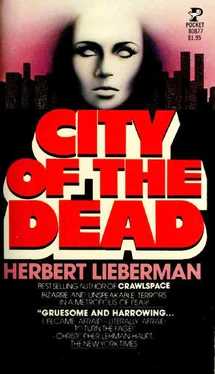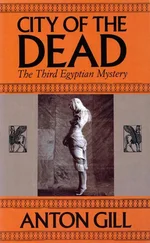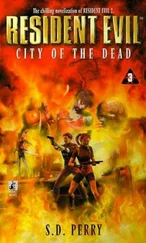Mr Bloom bites hard into his corned beef on rye. “So what’s next?”
“So,” says Flynn, “where do these papers go after they leave here?”
“Jobbers, wholesalers. They then distribute it to the newsstands and cigar stores in the area. That particular paper’s only distributed in the Clinton district. Comes out four times a year. Is that through the News or the Post, Tessie?”
“The News ,” says the big girl. “They slip it right in at the stand.”
Flynn nods and makes a note on his pad. “These jobbers—how many of them take care of the Clinton district?”
Bloom’s chewing comes to an abrupt halt, a bit of corned beef still sticking out of the corner of his mouth. He glances toward the girl. “Tessie?”
“We deal with four in that area,” she replies instantly. “Spiegel Kristofos Wagoner Brothers, and Charles.”
“Charles pay that bill yet Tessie?” Bloom snaps.
“No.” The girl looks uneasily at him. “Marty went over to see him today They promise for next Friday.”
“I’m not holding my breath Bloom inserts the final quarter of the sandwich into his mouth, continuing to speak all the while. “Go right ahead, Sergeant. Sorry to interrupt.”
“That’s okay.” Flynn smiles. “I’m almost finished anyway. Just one more question. You got any way of tellin’ me which one of those four distributors handled this particular piece of paper?”
Bloom chews pensively for a moment. “You got the invoice slips for that run, Tessie?”
“I’m pretty sure.” She glances nervously at Flynn. “Hold on. I’ll be back in a minute.”
She waddles quickly from the office with that curious, light-toed grace not uncharacteristic of very fat people. For a few moments the two men chat inanely about the weather while Bloom goes about the business of polishing off the remainder of his lunch. He now has before him a macaroon and a large paper container of tea with lemon.
Shortly the fat girl is back in the office with a thick folder of invoice sheets. Licking her thumb periodically, she flicks swiftly through them. “Okay—here it is,” she says, evidently pleased. “ Clintonian —Spiegel took the first two thousand, Charles took the next two thousand. The Wagoners took the next eight hundred, so that’d start with number 4001 and run through 4800. And Kristofos took all the rest—4801 through 7500. What number were you interested in again, Sergeant?”
“3118.”
“That’d have to be Charles,” Tessie says, snapping her invoice folder shut.
“Charles—my good friend Charles.” Mr. Bloom belches softly.
“Where is this Charles located?” asks Flynn.
The fat girl glances down at her invoice sheet. “452 West 49th.”
“Over by Tenth Avenue,” Bloom says. “You going over there?”
“Right now,” says Flynn.
“If you talk to Stanley, see if you can’t get my money.” Blooms chuckles. “Tell him you’re the police and I sent you over.”
Bloom laughs out loud; then, so does the fat girl.
“Say, what’s all this about, anyway?” Bloom bites deeply into his macaroon and waves the crumpled page of news-sheet at Flynn. “What’s all the big fuss about this piece of paper anyway?”
“Nothin’ much.” Flynn laughs along with him. “We just found a severed head wrapped up in it. We’re trying to find out who did the choppin’, that’s all.”
For a moment there’s complete silence as the laughter wanes on Mr. Bloom’s lips and his jaws cease to chew. Then the page of crumpled newssheet slips from his fingers, wafting languidly downward to his desktop like a snowflake. For a man who only moments before had been hooting with glee, who was even then still savoring the mingled flavors of his lunch, he appears suddenly green and queasy.
“Finish up your macaroon,” says Flynn, grinning broadly, “it looks very good. And thanks for everything.” He reaches across the desk and snatches up the torn, crumpled page from where it has lighted on the waxed paper and various leavings of Mr. Bloom’s lunch.
As he passes the fat girl on his way out, he tips his hat rafiishly and winks.
12:10 p.m. Grand Central Station, Upper Level.
The noon lunch hour. Crowds streaming out of the arrival gates, bustling through the arcades. Queues formed all about the place. OTB queues, New York State Lottery queues, Merrill Lynch “Big Board” queues, the Friday payday queues at the First National City minibank, at the Ticketron booth, at the Information Booth at the center of the station. Outside the gates of Track 17 there is the weekend queue waiting to board the 12:30 to New Haven and Boston.
Lunch hour crowds are rushing for the Oyster Bar, Charlie Brown’s, the Trattoria, Zum Zum, the Liggett’s lunch counter, the pizza stands, the frankfurter stands, the Carvel stands. They browse in the Doubleday Book Shops and wait for a chair at the Esquire bootblack stands.
Down an escalator from the mezzanine floor of the Pan Am Building, Paul Konig descends into the strangely muted electric glow of the Grand Central underworld. At the foot of the escalator Konig steps off the moving stair with a small, tentative hop that suggests frailty and old age. In his right hand he carries the Gladstone bag. He knows exactly where he is going, having been carefully instructed by the NYPD as to the exact location of that long bank of gray steel lockers in which baggage locker number 2384 is contained.
At the bottom of the escalator, Konig takes a sharp right, goes past a baggage counter. Then at the Esquire shoeshine stand he takes a sharp left. A few steps from there on his left again is a long wall of baggage lockers, battleship gray and much scarified with graffiti and the like. Directly opposite is a Savarin lunch bar.
At the moment of Konig’s appearance, the 12:15 from Stamford arrives, disgorging passengers through Gate 34, who swarm outward from there in all directions. Caught up in the dizzy tidal rush, Konig wends his way through a swarm of humanity. In a matter of moments he reaches the wall of lockers, his eyes streaming up, down, and across, searching for his number, his heart thudding in his chest. Number 2384 is at chest level near the center of the bank of lockers and it’s locked. The “key, carried in his trembling fingers from the moment he stepped from the cab and into the station, now jabs hectically at the hole. Two, three of those tremulous jabs go wildly awry, one at last connecting—and the key slides in effortlessly. A sharp twist now to the right, the lock disengages, and the door swings open to a stale, rather fetid emptiness.
Without hesitation, Konig hoists the Gladstone into the locker, slams the door shut, twists sharp left, thus locking it, then drops the key back into his pocket Now he turns sharply on his heel, and looking neither right nor left, he walks quickly out of the station.
At the Savarin lunch counter across the way, his back to the bar and having a beer, Francis Haggard watches Konig lumber heavily past the glass windows and disappear beyond, leaving in his wake an unimpeded view of wall lockers.
The detective sips his beer slowly. He knows it will be some time before Meacham makes his move, if indeed he makes one at all. Haggard’s own guess is that he won’t Not now. This is merely a trial run. A test to see how Konig performs. And just as Haggard has staked out the pick-up location, so he is certain that Meacham’s people have done the same. Within those hordes of people swarming past the windows like schools of fish, among the innumerable figures loitering in that area for one reason or another, among them, he is certain, are Meacham’s people. They’re doing precisely what he is doing—keeping locker 2384 under very close surveillance.
Читать дальше












